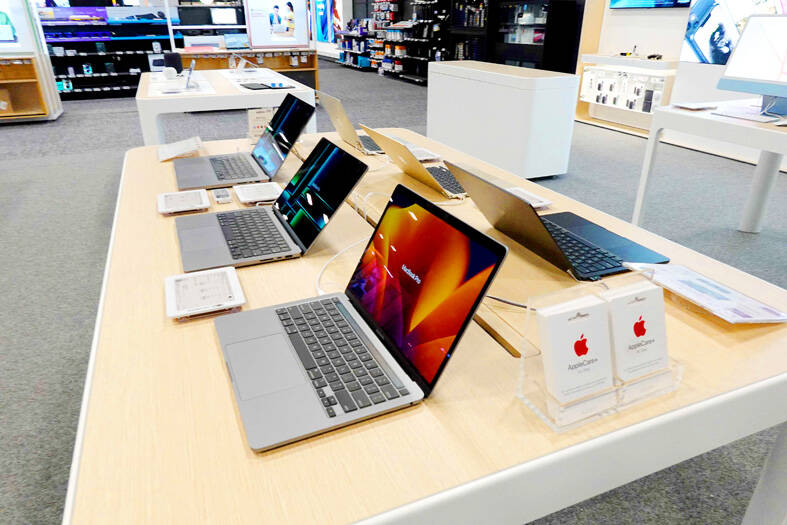Apple Inc is ramping up testing of fresh Macs with processors on a par with the M2 chip, making headway on key new machines that could help reverse a sales decline.
The Mac maker has begun testing the new machines with third-party apps from the App Store to validate their compatibility, according to developer logs shared with Bloomberg News.
That is a necessary step in the run-up to the launch of a new device.

Photo: AFP
Apple is counting on the new machines to entice shoppers after the worst Mac slump since the dot-com bust in 2000.
Shipments plunged more than 40 percent in the first quarter of this year, according to International Data Corp, making the Mac a laggard even in an industry suffering a sharp downturn across the board.
Apple had telegraphed that the quarter would be weak, but it would not provide its actual results for the period until May 4.
Against that backdrop, the new Macs would be a welcome arrival.
The test logs indicate Apple is readying a laptop with processor specifications similar to current models, but with a larger, higher-resolution display.
This model is likely to be the 15-inch MacBook Air that Apple has been planning to introduce this year.
A spokeswoman for Cupertino, California-based Apple declined to comment.
The chip in the new laptop has eight main processing cores and 10 graphics cores, just like the M2. The computer also includes 8 gigabytes of memory, in line with the existing MacBook Air.
The CPU, or main computing processor, continues to be split up between four high-performance cores and four efficiency cores. The Macs in testing are running macOS 14, the version of the Mac operating system that Apple is slated to announce on June 5 at its Worldwide Developers Conference.
Bigger changes to the Mac would come later with the release of an M3 chip, which would represent a transition to a 3-nanometer production process from the current 5-nanometer standard.
The newer chip technology — produced by Taiwan Semiconductor Manufacturing Co (台積電) — allows for improved performance and more efficiency. Apple is to use a similar technology in this year’s new iPhones.
Beyond the larger MacBook Air, the company is working on an update to the 13-inch Air model, the 24-inch iMac and the entry-level 13-inch MacBook Pro. The first Mac Pro using computer’s homegrown chips — known as Apple Silicon — is also in development, but has faced delays and specification changes.

SEMICONDUCTORS: The German laser and plasma generator company will expand its local services as its specialized offerings support Taiwan’s semiconductor industries Trumpf SE + Co KG, a global leader in supplying laser technology and plasma generators used in chip production, is expanding its investments in Taiwan in an effort to deeply integrate into the global semiconductor supply chain in the pursuit of growth. The company, headquartered in Ditzingen, Germany, has invested significantly in a newly inaugurated regional technical center for plasma generators in Taoyuan, its latest expansion in Taiwan after being engaged in various industries for more than 25 years. The center, the first of its kind Trumpf built outside Germany, aims to serve customers from Taiwan, Japan, Southeast Asia and South Korea,

POWERING UP: PSUs for AI servers made up about 50% of Delta’s total server PSU revenue during the first three quarters of last year, the company said Power supply and electronic components maker Delta Electronics Inc (台達電) reported record-high revenue of NT$161.61 billion (US$5.11 billion) for last quarter and said it remains positive about this quarter. Last quarter’s figure was up 7.6 percent from the previous quarter and 41.51 percent higher than a year earlier, and largely in line with Yuanta Securities Investment Consulting Co’s (元大投顧) forecast of NT$160 billion. Delta’s annual revenue last year rose 31.76 percent year-on-year to NT$554.89 billion, also a record high for the company. Its strong performance reflected continued demand for high-performance power solutions and advanced liquid-cooling products used in artificial intelligence (AI) data centers,

Gasoline and diesel prices at domestic fuel stations are to fall NT$0.2 per liter this week, down for a second consecutive week, CPC Corp, Taiwan (台灣中油) and Formosa Petrochemical Corp (台塑石化) announced yesterday. Effective today, gasoline prices at CPC and Formosa stations are to drop to NT$26.4, NT$27.9 and NT$29.9 per liter for 92, 95 and 98-octane unleaded gasoline respectively, the companies said in separate statements. The price of premium diesel is to fall to NT$24.8 per liter at CPC stations and NT$24.6 at Formosa pumps, they said. The price adjustments came even as international crude oil prices rose last week, as traders

SIZE MATTERS: TSMC started phasing out 8-inch wafer production last year, while Samsung is more aggressively retiring 8-inch capacity, TrendForce said Chipmakers are expected to raise prices of 8-inch wafers by up to 20 percent this year on concern over supply constraints as major contract chipmakers Taiwan Semiconductor Manufacturing Co (TSMC, 台積電) and Samsung Electronics Co gradually retire less advanced wafer capacity, TrendForce Corp (集邦科技) said yesterday. It is the first significant across-the-board price hike since a global semiconductor correction in 2023, the Taipei-based market researcher said in a report. Global 8-inch wafer capacity slid 0.3 percent year-on-year last year, although 8-inch wafer prices still hovered at relatively stable levels throughout the year, TrendForce said. The downward trend is expected to continue this year,